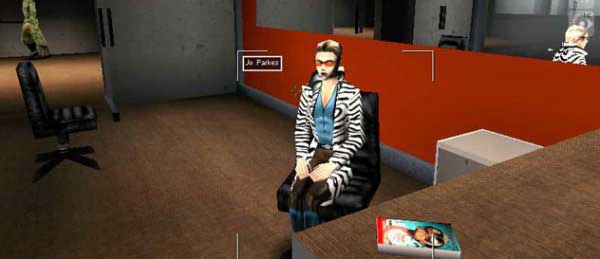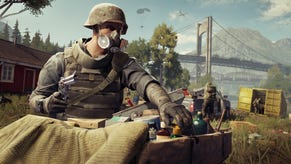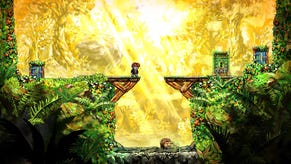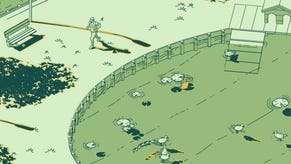Mod Creation For Idiots (By An Idiot)
[Five years back, I wrote a series of articles for PC Format magazine, about what learned from my time on a mod project. Namely, the Deus Ex mod Cassandra Project - whose site has been wiped, but is still available to download all over the place. Including here. This is all four merged into one, with a few Ed-comments where where things have changed enormously.]
The decision to do a mod is the first step. It’s also, by far, the easiest. From then on, you’re entering a painful world of hurting to strive to create something that, in all possibility, will never be finished or be completely ignored by the community. These are general rules that I’ve learned from my own time theoretically being in a mod team. I felt the pain so, ideally, you shouldn’t have to. Or rather unnecessary pain – no matter what you do, you're going to carry your own scars.

1) CONCEPTION
Before you dive in and start, you really should examine what you actually want to do. Try considering the following questions
1) What game do you want to mod for?
If the idea of modding something has entered your head, you’ve probably already decided what you want to create it for. At least take a second to consider whether this is actually smart in any way. If you’ve no experience in mapping, for example, choosing a detail heavy next-generation engine isn’t the smartest thing in the world [And this is more true now than it was when I wrote this - Ed]. While Half-life is massively documented currently, what’s going to happen when Half-life 2 arrives? Is it worth waiting to see what tools are released for it? While Quake 3 skills are one thing, its sure than Id’s next level designer will require a different approach – while all the Unreal Eds build on the same precepts, thus making the skills transferable.
2) What do you want to create?
Obvious, but do consider it. Examine your idea – does it hold an element of originality or do you just want to make some more levels for the game. There’s a difference between just wanting to make a level and making your level. If it’s that you just want to fiddle with the game world in a minor way, don’t even consider opening into a larger project. It’s not what you’re here for. Simply confine yourself to the basic editing tools and thus save yourself the heartbreak of even thinking of dealing with other people.
3) Is the mod project of such a size to demand the services of other people?
Because if it does, you need to consider about how you can get them. There’s a net-full of mods, and all are looking for various staff. While some mod-positions can be filled by someone working across several projects – music being a good example – others, like level designers, have to be concentrated on one mod to be effective. So what makes you attractive to people? Do you have any skills? If not, then putting together a Half-life mod team to do significant work is going to be a huge challenge. The community is in a mature state, with most of the experienced people well positioned in already existent teams with long running projects. They have no interest in helping the dream project of a no-name newbie. [Especially now when a good chunk of mod-teams seems to view it as a portfolio exercise rather than a for-kicks-and-giggles thing - Ed]
If your heart is set on creating a large one, you’ll have more luck in building it for a newer game. Getting into a community early is a good way of appropriating its talent. General rule: Mature communities are good if you want to join something. Immature communities are good for attempting grand designs. [I suspect that if this was ever true, it's less so now - Ed]
If you don't need more people, don't get more people. The important thing is to – well – skip as many corners as possible to minimise your work, and think of what you actually want to do. For example, working on something like Deus Ex as a single-man project isn’t a clever idea, unless you’re choosing to limit yourself to a single level. The real developers take a multiple-pass approach, with different people with separate skill-sets taking turns to add their materials to the levels. For one person to do it all is an overwhelming task.
For action people, a multiplayer map system is a wise idea for a fairly simple project. For coders, consider a mod that alters the game in a simple yet meaningful way. Those who want to dabble in textures may just concentrate on that, or find a community like Freedom Force where most people just do textures. For fans of narrative, you’ll ideally want something that looks after the huge chunk of the visual side itself, leaving you to just design - think of Neverwinter Nights.
4) Is your mod project of such a size to be impossible within the time-frame of a human life?
And be honest. If you’ve never made a mod, starting work on a multi-map single-player campaign with new models and textures is a recipe for disaster. Consider whether it’ll be better putting your idea on hold while you gain skills and a reputation – people in the community, having seen examples of your talent and determination on a smaller project, are far more likely to sign up for something larger.
5) Do you mind sacrificing elements of your life? Do you mind not finishing your mod?
Because it’s really a case or one of the other. A mod of any size is considerable work. You can’t merely write it in your “Free” time – there’s never enough. You have to actively decide that you want to free-up time to get anywhere near completion. No, you can’t go down the pub. No, you can’t pop down the cinema. No, you can’t see your better half tonight. You have work to do. To choose a particularly bad example, I took a week off work to try and get some of Cassandra's scripting sorted. Literally the whole week was taken up with wrestling with a single thing, eventually discovering that the game simply wouldn't do what I asked of it. Are you willing to throw your life into something just to try and get it done?
Alternatively, if you don’t mind if you don’t finish it – the process rather than the release is your pleasure – be aware of it. And if you’re trying to drag other people aboard, make sure they understand it too. Wasting people’s time in the mod community is epidemic. Conversely, when it comes to trying to recruit more people to your project, determination is by far the most important thing.
Which leads neatly to recruitment. Now, If you had any sense, you'll have decided to do something all on your lonesome. In which case, you can - er - skip a bit. If you're looking to recruit people... well, think again. In fact, more than that. Go to a mirror. Look directly into your eyes and ask yourself the following question: “Why on earth would anyone want to work on my mod more than anyone else’s?”. The answer “Because I’m a beautiful, beautiful person”, sadly, doesn’t quite cut it. If you can’t think of an answer, you’re in serious trouble, as it’s not just about attracting the people to your project – but the right people. And the right-people don’t like nobodies.
If you have no skills whatsoever, you should acquire some. Really. And if you have skills, but no evidence of them, you should consider proving yourself. If you’re a mapper, do some stand alone work and release it into the community. If you consider this a waste of effort, make these levels you plan to reuse in the mod proper. When it comes to advertising, being able to write “Creator of popular DM level Rapture the Christians seeks mod team” is better than “Geezer you’ve never heard of seeks people willing to waste time”. Equally, if you’re planning a mod which has a fairly core piece of coding in the centre – like Thievery’s invisibility or Counter-strike’s unique structure – and you’re the coder yourself, getting that thing working and releasing as an early version to attract people to may be an idea. Alternatively, just joining another mod team, working on theirs until a release and then starting up your own may be more profitable. The important thing in all of these is proving, publicly, that you can finish work you commit to. Joining a mod-team and then quitting is actually counter-productive, in all but the rarest cases. It makes you look like a flake. Because you are a flake.
If all of that sounds like too much work, well… well, you’re never going to finish your mod, so just stop reading and go outside. But if you are looking for a short-cut to gathering a team, consider basing your game on a popular TV show or toy line. Post that you’re starting a Transformer or Star Wars mod, and you’ll have to beat off help with a stick. Of course, you’ll probably be closed down by the licence holder’s lawyers, but a terrible lack of imagination comes with such a price.
When it comes to advertising, be careful. A bad advert is the one sure way to scare people off. Obvious things to avoid is writing your entire e-mail in gibberish netspeak with no paragraph breaks. These are adverts. The more effort you put into it gives the impression of putting effort into the whole project. Spellcheck. Rewrite. If it’s a new community, sending your e-mail to all the fansites will get a news story, which is always good exposure – if it’s a more mature community, the announcement of a new mod probably won’t get coverage. The basic level should be to post to editing and creative forums associated with the game. Ideally, you should be an active participant in every forum you post too. If you’re a stranger, it looks like spam, which is hated. If you’re someone they’re aware of, people are intrigued what this regular is up to.
Also avoid advertising for – well – the complete list of development staff. The bigger your team when you’re starting, the more teething problems you’ll have when getting going. For example, do you really need a musician or an SFX man at the beginning of the project when you’ve little need of what sound you actually need? If not, well, don’t ask for it. A few level designers, a coder, possibly a modeller and a concept artist if you’re feeling all fancy what’s required for most things to get going. When you know what extra stuff is required, then go and find people to do it. Having people sitting around twiddling their fingers is one sure way to make them lose their initial enthusiasm – and having fresh, excited people join half way through is one way to give morale a boost.
And here's some general tips in dealing with applications:
Have they referenced a work sample?
You should ask to see a sample of work before accepting anyone – you should have asked for this in the advert. Like, obv.
Is the sample finished?
If it is, this is an incredibly good sign. Someone capable of doing their own thing is to be hailed. If it’s a sample they’ve made especially for you, clearly you don’t need to worry so much about it being finished. Be sure if they ask you what to make, you have a sample idea for them.
Is the sample they made for you timely?
If they say they’ll have a sample done for you by a certain point, note it. The longer they over-run the date, the longer they’ll over-run stuff later in the project. If it goes considerably past what they promised, especially with no excuses, don’t even consider them. Such behaviour will only get worse. Realising your whole project is hanging on one person doing something they said they'd do for the last four months is heartbreaking. Cassandra's release was delayed by months due to a voice-actor not actually being bothered to hook up their mike, for example.
Do you like them?
As it counts. Mods can be fun, but they’re work. Working with someone who immediately gets up your nose is hellish. If they’re massively skilled but simultaneously totally arrogant, don’t consider letting them in. It will almost certainly tear your mod apart.
And as for general processing notes: Be quick in all responses. Explain what’s happening after they’ve submitted stuff. If there’s a delay in the process, be sure to write and tell why. If there’s a delay in any communication, apologise for it. If you don’t decide to take them on, write back and be apologetic – but leave the door open to get back to them by saying something like “We’re trying to keep a small team now – but if there’s anything in future which may suit you, can we get back to you?”. This goes especially for jobs like Musicians or SFX guys who you probably don’t need at this point.

3) ACTUALLY DOING IT: THE WORK
You’re away then. You’ve thrown caution to the wind, gathered a team and actually started doing the work with varying levels of enthusiasm. Clearly, this stage can continue for as long as it takes, but it’s fair to divide it into two basic sub-sections. The first is The Work, and dealt with here. The second is Finishing The Bastard, which is the next section. Trust me, they’re very different.
First thing is that it really is work, and should be planned as such. As I’ve said earlier, you really need to be aware you have to sacrifice other elements of your life to get it done. If you just rely on your free time, the Mod will fail. You may find it helpful to actually time-table periods when you can do stuff, in the same way you would book a regular evening class. If every night you put aside a limited amount of time to do work, you’ll make steady progress. This is considerably healthier than the boom/bust approach which most modders will follow. But – y’know – most people on your team will move on a cycle of massive productivity followed by long fallow periods.
Be sure to identify the personal habits of each of your members, knowing their habits and abilities, and assign work appropriately. It may be useful to mentally divide your staff into two vague categories: Reliable and Total Flakes. You can trust the former to be committed. The latter will do really good work intermittently, but eventually disappear for long periods. Clearly, give essential jobs to the former and inessential ones to the latter. The skill is realising what are the essential gigs and what aren’t. For example, in textures, skins for the weapons you’ve modelled are of paramount importance. Reskins for a few of the standard game models to add colour to your world aren’t. If your Mod is in a position where it relies on one of your Flake characters to do something, make sure it’s the first thing they do. For example, if your coder is a flake, make sure he performs the basic changes to your interface before dabbling in minor alterations to the weapons or whatever.
This leads to an obvious second point: Are you a flake? You are. Shit. You’re really doomed. One of the odder things about a team-based mod dynamic is that work begats more work. If someone is producing interesting stuff, it leads to more people producing interesting stuff. Seeing that you’re actually getting there, no matter how slowly, is massively encouraging. Inertia can keep things rolling. However, the converse is also true. If no-one’s producing work, it takes a brave person to try and get things moving. That brave person has to be you. At the least, go on your internal forum every-day and give feedback to anything anyone posts. Also, encourage a climate where people post examples or screenshots of their work to the rest of the team. It’s much more helpful to the team morale to see other people’s stuff rather than everyone quietly beavering away by themselves.
And here’s another Golden Rule: Make It Playable. You’re making levels, not beautiful architecture. The biggest morale boost is being able to actually sit down and play your game, no matter how rudimentary a form. To choose an example from my Mod team, a mapper spent a year making a genuinely beautiful, sprawling map. However, it simply wasn’t playable and when we attempted to make it so, it all fell apart. If we’d had interactive elements earlier, this would have become obvious immediately and all the effort saved. As it was, the mapper was burnt out from his experiences and dropped away from the team, leaving us with an extremely pretty yet completely useless map.
Equally, encourage a climate where simple test levels are constructed to experiment with core concepts. So, yes, the CIA Base or whatever isn’t finished, but you can try out the new armoury on this mini-level. This is especially important if you’re working on a game like Deus Ex, where you may be taking a multi-pass approach to level design. This is where different people go into the level to do different things. One person makes architecture, passes it to the texture artist, passes it to a game-element person who passes it to a script-writer guy. If you can set up your work prior to getting the level, you clearly save the time. Finally remember to set objectives and make priority lists. Make sure each person knows exactly what their list of responsibilities are for creating assets.
Something I found useful was trying to make a virtue out of necessity. At one point in the modding sequence, especially in a single-player game, you’ll find you want the game to do something that it simply hasn’t been designed to do. Rather than spend months making it do what you want to, turn it into a plot point. For example, in Deus Ex children models can’t actually sit down, making a Classroom scene in the second unfinished episode we were considering somewhat difficult. Until we decided to make them all stand up as a punishment thing. Hurrah.
Oh – and one last clue. No matter what you ask your team to do, if they really want to do something else, they will. If the modeller has their heart on making an unusual gun model, they’ll do it whether it’s needed or not. The coder’s novel lock-pick system. The mappers odder designs for layouts. Hell, the example of the base earlier - it's not as if I didn't tell them to try and make it playable earlier. Since you can’t control them, try to guide their enthusiasm. Give them room to express themselves. Because no matter whose idea it was originally, it’s all your vision now. And abstractly, as long as it's their vision and they feel they're doing worthwhile work, they should keep on working.
Abstract. Frankly, you may as well play Russian Roulette. The odds are about the same, it's about as harmful to yourself and is considerably quicker.
While all this is going on, you may be considering hyping your mod. Now, it’s easy to get carried away with Public Relations. Many Mods are much better at building their website than actually constructing anything worthwhile. The web is littered with a million and one mod-websites consisting of some rudimentary concept drawings, an early screenshot and an over-ambitious feature list. However, this isn’t to say such things don’t have their worth. A relatively simple website, updated relatively regularly will keep people vaguely interested in what you’re up to.
More importantly, is your position in the game community which your mod belongs to. When something major appears on your site, send a simple press release to the major websites of your game. Clearly, you’re more likely to get a mention if you’re writing for a smaller game rather than Half-life or whatever. The former are desperate for news and the latter, basically, aren’t. Equally, consider being a presence on the major message boards devoted to the game. A quiet, charming, professional presence can engender a lot of respect in the community. And this will lead to respect for the mod. While mods are played outside the hardcore community, it’s the people who frequent the sites specialist to a single site who will play it first and start word of mouth.
Of course, if you’ve got a tendency to swear, shout and say that people suck, it may be a good idea to avoid forums. Bad impressions are just as easy to get as good ones.
Before we move onto the grand finale, I mentioned that you probably didn't need certain sorts of creatives early on. However, as you inch towards the close, it may be worth reaching out for some specialists. While none are essential for a good mod, it can add a certain professional touch. Unless you mess it up completely, in which case you’re doomed to being sniggered at beyond all human belief.
MUSIC: Of all the things you can add, this is the easiest to increase to a semi-professional level. This is, of course, because most videogame music is terrible and something someone with a modicum of talent has made on a tracker program will almost certainly be good enough. Most games currently use tracker files to create their soundtracks, though it’s possible through trickery to transfer MP3 files into it. The results are, mostly, fairly rubbish. A simple advertisement on the community site should get a number of auditions, of which you can select your favourite. [And obviously, in the world of internet music that's sprung up since I wrote the article, there's a mass of bands. If I was running a mod now, I'd reach out to an indie band I liked on MySpace and try and ask if we could include their music in the game - they may like the exposure. - Ed]
VOICE ACTING: This is perhaps the trickiest thing to sort out. Whatever you do, don’t just get a microphone and garble some gibberish into it – except as a place-holder. In which case, be careful, as place-holders have a horrible habit of actually slipping into the finished game. If you really want voice-acting, probably the best starting point is visiting one of the many voice-acting communities online. Mainly comprising of American teenage girls, they do radio-plays based around virtually everything, but can be tempted into doing Mod work if you’re polite and kind. Note: Getting accents other than American can be a little bit tricky.
WRITING: This is problematic in an entirely different way. Everyone, but everyone, thinks they can write. They start typing – and there’s words. And since they have ideas, they must be a writer, yeah? Well, no. Even if your ideas are good, your prose is – almost certainly – rubbish. The solution could be to get a writer to join the team later to transform any placeholder text into something that’s’ a bit more impressive. The web is full of amateur writing and fanfic communities – if there’s someone who’s actually good at writing fiction about your the game you're modding, they're probably a good bet. Given the quality of the average fanfic writer, this is something of a long-shot. The bigger problem is that writers tend to be egotistical idea people - and writing is, fundamentally, an act of structure. Not being able to decide on the structure (i.e. having to just write around what the game already is) will probably make them more trouble than they're worth. It's probably not worth worrying about. Most professional videogames don’t bother hiring a decent writer, so it’s clearly a bit presumptuous to for you to give it a shot.
4) ACTUALLY DOING IT: FINISHING THE BASTARD
In every successful mod development cycle, there comes a time. That is the time to finish it. And when does that come? Well, the perennially optimistic – and there aren’t many people around at the conclusion of a mod who have that particular character quality – might believe that the mod is finished when everything in it’s actually done, polished and ready for release. Sadly, this isn’t true.
Let me let you into a big secret: a mod is never finished. In fact, a game is never really finished. There’s always more bugs to find. And the longer you look, the more ideas you have for things that would improve the game immeasurably, so you add them. The only time something is finished is when you decide that it’s finished, pack it up in an installing program and release the thing.
In the case of real developers, they plan their release based upon their budgets, reappraising the game when it becomes clear that they’re not going to finish it before the money runs out. In Mods, the “budget” is in the human interest of the team. Over time, you may notice that the work comes in spurts. You’ll also notice that the spurts get increasingly few as you continue. If you pay attention to these, you may be able to guess when the Mod will run out of steam. Now look at what you’ve got to do to complete your master plan and compare it to the amount of development power you have left. In rare cases, you’ll realise that you’re going to be fine. Mostly, you’ll find the cold knowledge that it’s not going to be enough.
At this point, a thorough re-evaluation of the project is necessary. In the same way the body will divert blood towards the vital organs if placed in stress to ensure survival, development effort should be focused to what’s absolutely necessary to gain a release. If you’re a multiplayer mod, you’ve got a number of advantages in this situation. For example, it’s traditional in the form to release multiple versions, each improving in piecemeal steps [Not as true anymore, alas. - Ed]. If you go back to the extremely early versions of Counter-strike, for example, you’ll find them almost shockingly primitive. However, as long as you’ve got the core of the mod there, you can get feedback, alter the options, and improve for the next release. While entering with a brilliant mod people can’t believe is great, doing it step by step is perfectly acceptable. This also has the bonus of a release of something decent gives the team another rush of energy. Feedback and attention is massively invigorating. While you may claim to just be doing this for the sheer pleasure, you’ll be surprised how motivating attention of the community is. Also, a release will usually gather some people wanting to join your mod, meaning fresh blood. Release early, release often: These are a multiplayer mod’s watchwords.
Things aren’t so easy if you’re a single-player mod. It’s likely that people will only ever play a mod once. If it’s rubbish, they’re not going to replay it to discover what changes you’ve made in a second release. This means that what you throw out into the world needs to be, basically, the finished article. There are ways around this dilemma, however. You’ll probably find that the actual creation of the levels is what’s lagging behind, with some areas in your master plan being completely under-developed. If possible, consider making your mod into an episodic one. This would allow your mappers to concentrate their attention on those early in the narrative to bring them up to a release state, and not worry about the rest. If that’s impossible – and I pity you if it is – then have a good look at the structure, especially the levels which are barely finished. Do you really need them? Could you tweak the plot slightly so that you don’t have to visit there? Could you even cheat completely and re-purpose a map from the game proper and change all the details? If so, bite the bullet and do it. There’s a lot of pride-swallowing to do before you’ll get a game anywhere near release. The same goes doubly so for any of the non-essentials. Do you actually need a new model for the gun or could you reskin one of the games standard ones for a similar effect? Alternatively, could you talk someone who’s released a gun into the community to let you use theirs?
The second you’ve got everything tied down, it’s time to go through the hell of bug-fixing. This always takes longer than you’ll expect – as does everything, remember. Be sure to include a healthy space of time inside your enthusiasm-plan for this essential aspect. You’ll find more bugs than you’ll ever hope to fix. Yet again, prioritise the bugs that actively break your game into tiny little pieces rather than the ones which can be passed off as some kind of hidden Easter-Egg feature. As I said at the start, bug-fixing is an infinite task. Something will always go wrong. Eventually, it’s enough. And when it’s enough, release it. Quickly, before you lose the nerve and congratulate yourself on actually managing to do it. None of your friends will believe it.
[If you want to contrast the above, I'll point you over at comrade Always Black's presentation he made about managing a mod project - namely Cassandra. He has a slightly different take than me, to say the least]











